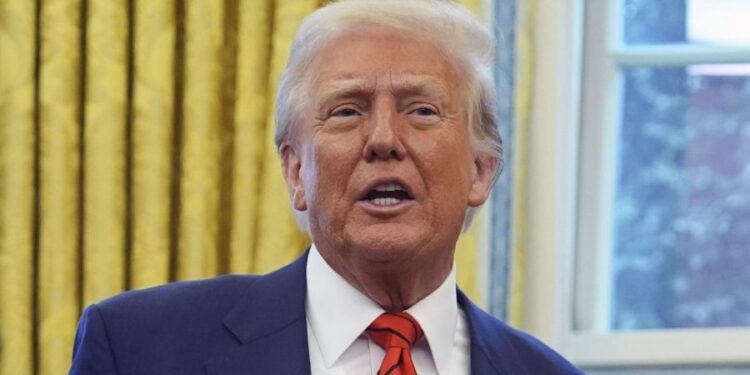
President Trump’s wholesale firing of 18 inspectors general, including myself, (IGs) raises questions about the future of government oversight, transparency and accountability.
IGs are the so-called “watchdogs” inside federal agencies. Their job is to prevent and detect waste, fraud and abuse inside their agencies through fair, objective and independent oversight. Their offices produce audits, inspections and evaluations, and conduct criminal and ethics investigations to promote effectiveness and efficiency throughout the federal government.
When I was inspector general of the U.S. Department of the Interior and the chair of the Council of Inspectors General, I viewed myself and my IG peers as the taxpayers’ representatives inside our agencies.
The cornerstone of IG efficacy is independence. For 40+ years, the entire construct of IG oversight rests on our neutral and objective assessment of federal programs and operations. If IGs are viewed by our agencies, Congress or the American public as beholden to one political party or ideology, then no one would trust our reports, findings or recommendations for improvement.
So one of the critical questions from the spate of IG firings is what comes next? Accounting for all vacant IG positions that are appointed by the president, there are 25 IG vacancies. It is critical that President Trump nominate qualified individuals to those positions — not just in the sense of technical competence, but also in their willingness to conduct fair, objective and independent oversight for the American people.
As the chair and vice chair of the Council of Inspectors General for the past four years, I led the panel of IGs who make recommendations to the White House about who would be successful IGs. We interviewed well more than 100 candidates over those years and made dozens of recommendations — and declined to recommend dozens of others.
Here are some touchstones that we saw to assess whether a candidate is likely to be a successful Inspector General, one who fulfills the role in the way it was designed and as the American people deserve. I hope the president and White House staff will consider these concepts as they review potential nominees for these crucial positions.
Moreover, I hope that the relevant Senate committees — and indeed the American people — will examine President Trump’s IG nominees through the prism of these considerations. They are obviously not guarantees, but experience in these areas will increase the likelihood of success as an Inspector General.
First is competence, essentially the ability to do the job. The Inspector General Act lays out several requirements for inspectors general: the president shall appoint IGs “without regard to political affiliation and solely on the basis of integrity and demonstrated ability in accounting, auditing, financial analysis, law, management analysis, public administration or investigations.”
But these are broad, provide little guidance and frankly miss the mark in several ways. IG nominees should be comfortable with the bread and butter matters for IGs: government auditing and criminal investigations, not to mention federal appropriations law, procurement and grant oversight and a host of ethics rules.
In addition, serving as an inspector general is much more than bean-counting; it can require extensive engagement with Congress and the executive branch. Therefore, substantive experience with navigating the halls of Congress and the byzantine executive branch will help lay the foundation for success.
Notably, experience in the IG or oversight community is not essential. We have seen successful IGs from outside the government, but it is crucial that they have a deep appreciation of the role of oversight and how IGs add value to their agencies.
Another good harbinger for success as an IG is meaningful leadership experience. Remember that these positions set the vision for their organizations, determine organizational priorities and can lead staffs of hundreds — if not thousands — of professionals.
In my experience, IGs run into trouble not from the substantive work, such as their audits, inspections or investigations, but rather from bad leadership choices. Over and over, we have seen IGs who founder largely because they never led an organization before. That in turn can lead to problems with their oversight, but it usually starts with leadership ineptitude, not inadequate audit or investigatory experience.
They are simply ill-prepared to chart a course and articulate priorities for hundreds of employees, communicate with staff of different disciplines, hold a senior executive accountable for their division’s performance, make hard calls on budgets involving tens or hundreds of millions of dollars and engage with stakeholders like Congressional committees.
Leadership skills should not be on-the-job training, especially not in these high-stakes positions. I would therefore urge the president to nominate candidates with substantial leadership on their resumes and encourage the Senate as it engages throughout the confirmation process to evaluate nominees based on their meaningful leadership experience. In short, a candidate without substantial leadership roles should throw up significant red flags.
The final — and perhaps most critical — issue is independence. This is the single most important element of a successful inspector general: the ability to provide fair, objective and independent oversight. IGs not only have to be apolitical but the American public and stakeholders in Congress and the federal government must also perceive them as apolitical.
For instance, the Department of the Interior, where I served as inspector general, has extensive jurisdiction over oil and gas production on federal lands. If I had written social media posts with “Drill, baby, drill!” would Congress view my reports on the Department’s wind and solar energy efforts with any credibility?
On the flip side, if my Instagram feed were replete with climate change activism, the American public would surely take my recommendations about oil and gas leasing programs with a grain of salt. Similarly, my credibility would be shot if I were a financial donor or bundler for one presidential candidate or, as a lawyer, I represented a family member of a candidate.
With that in mind, I would urge the president to nominate individuals who do not have issues in their past that would undermine their independence or the perception thereof. That means social media posts, sizeable political donations or partisan activity, speeches, client representations or similar elements that would cause a reasonable person to question their findings and recommendations.
Moreover, I would encourage the Senate and the American public to scour IG nominees’ records for these tell-tale signs of a lack of independence.
These three areas — competence, leadership and independence — should be the focal point for IG nominations. In my experience reviewing hundreds of IG candidates for the past four years, these should be the touchstones for evaluating potential IGs going forward, in all administrations regardless of political party.
Nominating leaders who fit the bill in these three areas will certainly raise the likelihood of appointing effective watchdogs, not lapdogs.
Mark Greenblatt was inspector general of the United States Department of Interior from August 2019 until January 2025. He also served as chair of the Council of the Inspectors General on Integrity and Efficiency from 2023-2024 and as vice chair from 2022-2023.







